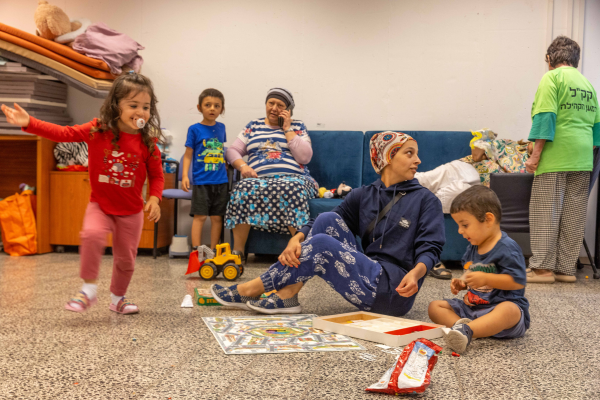A Masa Israel organization offers vital one-day nature trips for displaced Israeli children, providing respite and a space to process their experiences amid the ongoing conflict.
By Troy O. Fritzhand, Algemeiner
I Belong Israel, a program of the Masa Israeli organization, is not used to working in times of war. During peacetime, the program brings Israeli students, soldiers, and professional groups around the country for trips to help deepen their Jewish and Israeli identities. However, since the outbreak of Israel’s war against Hamas in Gaza, Masa Israeli has shifted its focus in the short term to assisting the young boys and girls currently displaced across the country.
Dror Hamawy, the group’s director of education, told The Algemeiner that the “dramatic situation” in the country pushed the educational nonprofit to act. Normally, Masa Israeli’s trips are six days, and the group will take children on masaot (“journeys” in Hebrew) to showcase the deep Jewish connection to Israel, allowing them to “understand they are a part of the Jewish people,” said Hamawy.
Now the trips are just for one day.
Since the outbreak of the war, hundreds of thousands of Israelis have been displaced because their homes were either destroyed or constant targets of rocket fire from Hamas in Gaza and both Hamas and Hezbollah in Lebanon.
Israeli civilians have been placed in different parts of the country, such as Eilat, the Dead Sea, and the Jerusalem area, mainly in hotels — though some have been fortunate to relocate temporarily in homes of gracious hosts.
Sivan Dinar, who directs Masa Israeli’s summer camp programming, said that children “are stuck in small rooms 24/7,” explaining that these trips finally give them the opportunity to “get out and to speak.”
She said the kids and their parents have been enthusiastic about the programming, and that “it is exactly what they were looking for.”
The trips, fully funded by private donors, are organized in the surrounding area of where the kids are staying and are accompanied by Masa Israeli’s trip facilitators. They go into nature and allow the children to “clear their minds” and calm down from the ongoing war.
As of now, the Israeli government has said that evacuees will have their hotels paid for until the end of year, although it is likely to be extended if the war drags on.
Masa Israeli has already started planning longer trips for the kids, including a “winter camp” that will be five days long and allowing for over-nighting at their facilities.
Hamawy said the children who participated have been “very sweet” while dealing with the trauma of the war in their own ways. The trips leave in 15-20 person groups and are back for dinner time.
Part of the trip allows the children to “speak about what happens and to process it,” according to Dinar. Given that the children range from very young to near the end of high school, how they speak about Hamas’ Oct. 7 massacre and the subsequent war takes different forms. All in all though, she said “nature calms them.”
Masa Israeli wants to continue its work as long as is needed to support the evacuees and the survivors of Hamas’ brutal attack. Their work, though tough, has been necessary and important, organizers argued.
“We are doing something unique for them,” said Hamawy.
Troy O. Fritzhand, who goes by Osher in Hebrew, is a Jerusalem-based journalist covering Israeli politics, culture, and technology. An immigrant from New York, Troy is an entrepreneur and Hebrew thinker who helps oversee the start-up ecosystem in Jerusalem with Made in JLM. You can learn more about him at troyfritzhand.com. He previously served as the Politics and Knesset reporter at The Jerusalem Post and has been published in Jewish News Syndicate (JNS).
Do You Love Israel? Make a Donation - Show Your Support!
Donate to vital charities that help protect Israeli citizens and inspire millions around the world to support Israel too!
Now more than ever, Israel needs your help to fight and win the war -- including on the battlefield of public opinion.
Antisemitism, anti-Israel bias and boycotts are out of control. Israel's enemies are inciting terror and violence against innocent Israelis and Jews around the world. Help us fight back!
